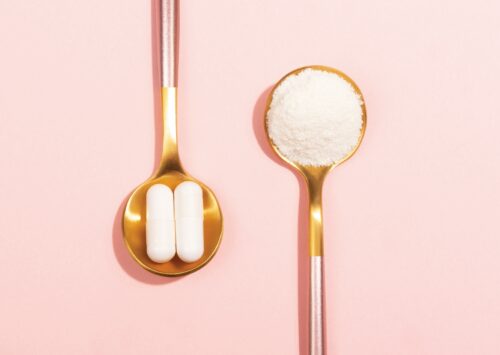
Collagen is growing in popularity as a supplement, with all sorts of accompanying claims. Nutrition research scientist Tim Crowe and dietitian Katrina Pace sort the wheat from the chaff.
Collagen is the most abundant protein in our body. It gives elasticity, strength and stability to many tissues, including skin, bone, ligaments and tendons. Collagen supplements are often promoted as beneficial for joint care or hair, nail and skin care. But what does the science say?
What is collagen?
The structure of collagen has a triple helix arrangement of long chains of amino acids – like a rope with many fibres intertwined. This gives collagen a lot of strength, so it’s no wonder its leading role is as a scaffold, giving structure and strength to tissues such as skin and bones. One of the things that makes collagen different from other proteins is its amino acid mix. Every third residue is a glycine amino acid, and it mostly follows a common repeating sequence of just three amino acids: glycine, proline and hydroxyproline.
Hydroxyproline is unique to collagen. It’s made from proline and needs vitamin C to make it happen. Scurvy, the classic condition associated with vitamin C deficiency, often leads to bruising and bleeding gums – signs of weakened collagen structures. Collagen, though, is not one molecule. There are at least 28 distinct types, but it is types I, II and III that are the most abundant. You’ll find type I collagen in the connective tissue of tendons, ligaments, corneas, bones and skin. Type III collagen is usually found along with type I collagen in the skin and blood vessels. Type II is mostly found in cartilage.
What’s available?
Refined collagen capsules are common, but powdered collagen hydrolysate is most popular. Powders are generally pure collagen hydrolysate, but the capsules may contain other vitamins, minerals or herbal compounds. Check the amount of vitamins and minerals you’re getting in total if you’re taking more than one supplement a day.
Why hydrolysed?
When it comes to oral collagen supplements, hydrolysed collagen dominates the market. Hydrolysed means the breaking down of a molecule with water. If you heat collagen, you denature the protein and are left with gelatine – a great gelling agent for food and drinks, but with large, fairly insoluble molecules. Hydrolysed proteins are smaller in length so they’re absorbed faster. Hydrolysed collagen is also much more soluble in water than gelatine, making it more convenient to add to drinks. The collagen used in most supplements comes from cattle, pigs, chicken and marine sources. It uses what would be a waste product in the processing of animals and fish for human consumption.
What about vegan collagen?
What is promoted as vegan collagen is normally just an amino acid ‘soup’ with a lot of other vitamins, minerals and botanicals thrown in and it is missing the important hydroxyproline peptides. It is promoted as a collagen booster but there are no human clinical trials to support this. Lab-made collagen is being developed, but it is expensive and genetically modified.
Why do people take collagen?
Joint pain, osteoporosis and osteoarthritis
Collagen plays an important role in stabilising joints, providing structure in bones and maintaining elasticity of ligaments and tendons. A 2016 systematic review, looking at both rodent and human studies, found collagen supplements may be beneficial for improving movement and strength in joints. A daily dose equivalent to 12g collagen hydrolysate powder seemed to help symptoms of osteoporosis and osteoarthritis. In one study, with 200 people aged 50 years and older, six months of taking a supplement containing 1200mg (1.2g) of collagen hydrolysate showed improvement in symptoms of joint pain.
Skin, hair and nails
Collagen gives skin its elasticity and nails their hard structure. Studies seem to show collagen supplements can improve skin elasticity and hydration. There is no consensus as to how much collagen is needed, but most studies have used 5g-20g collagen hydrolysate daily.
Gut health
Recently, collagen powder has been promoted to help gut health. The link between collagen and digestion is that the gut, as a muscle, needs collagen to remain elastic. Inflammatory bowel diseases (IBD) are characterised by disordered clumping of collagen fibres, and low blood levels of certain types of collagen have been seen in one study in a group of people with IBD. However, no research has directly linked collagen supplements to improved gut health or digestion.
Side effects
Collagen is quite a safe supplement to take, with no recognised upper limit. Some people report bloating, reflux or indigestion, possibly related to either the high amount of protein in collagen or the ability of collagen to bind with water. If you’re allergic to fish, avoid a marine-based collagen supplement.
Can’t I just get collagen from food?
Gelatine-containing foods, such as jelly, are high in collagen. Bone broths, where the cartilage is boiled down, also contain collagen.
References
de Miranda et al. 2021. Effects of hydrolyzed collagen supplementation on skin aging: a systematic review and meta-analysis. Int J Dermatol. 60(12):1449-1461
García-Coronado et al. 2019. Effect of collagen supplementation on osteoarthritis symptoms: a meta-analysis of randomized placebo-controlled trials. Int Orthop. 43:531–538.
Bruyère O et al. 2012. Effect of collagen hydrolysate in articular pain: A 6-month randomized, double-blind, placebo controlled study. Complement Ther Med. 20:124-30.
Fratzl P. 2008. Collagen: Structure and mechanics, an introduction. In Collagen. 1-13. Springer: Boston, MA.
Khatri et al. 2021. The effects of collagen peptide supplementation on body composition, collagen synthesis, and recovery from joint injury and exercise: a systematic review. Amino Acids. 53:1493–1506.
Koutroubakis et al. 2003. Serum laminin and collagen IV in inflammatory bowel disease. J Clin Pathol. 56:817-20.
Porfírio E & Fanaro GB. 2016. Collagen supplementation as a complementary therapy for the prevention and treatment of osteoporosis and osteoarthritis: A systematic review. Rev Bras Geriatr Gerontol. 1:153-64.
Vollmer D et al. 2018. Enhancing skin health: By oral administration of natural compounds and minerals with implications to the dermal microbiome. Int J Mol Sci. 19:3059-94
www.healthyfood.com










